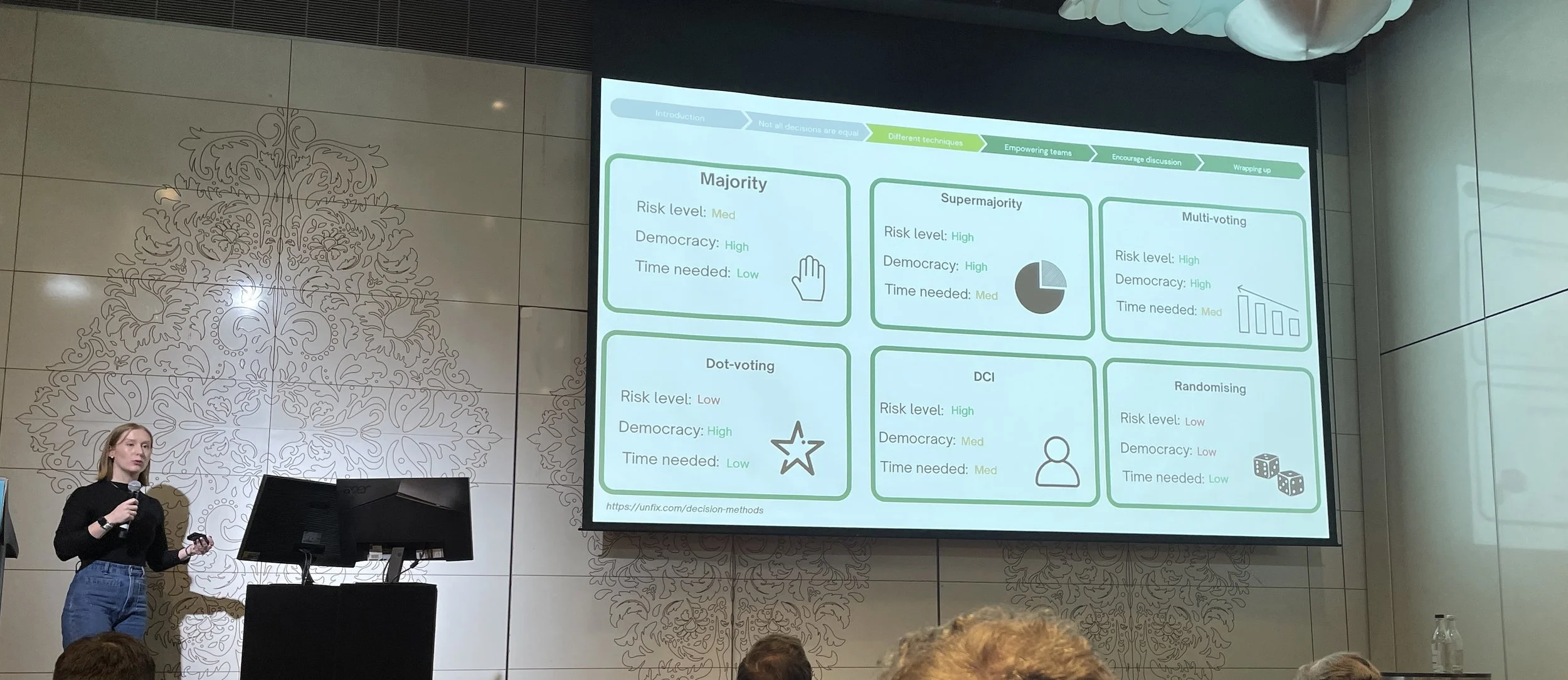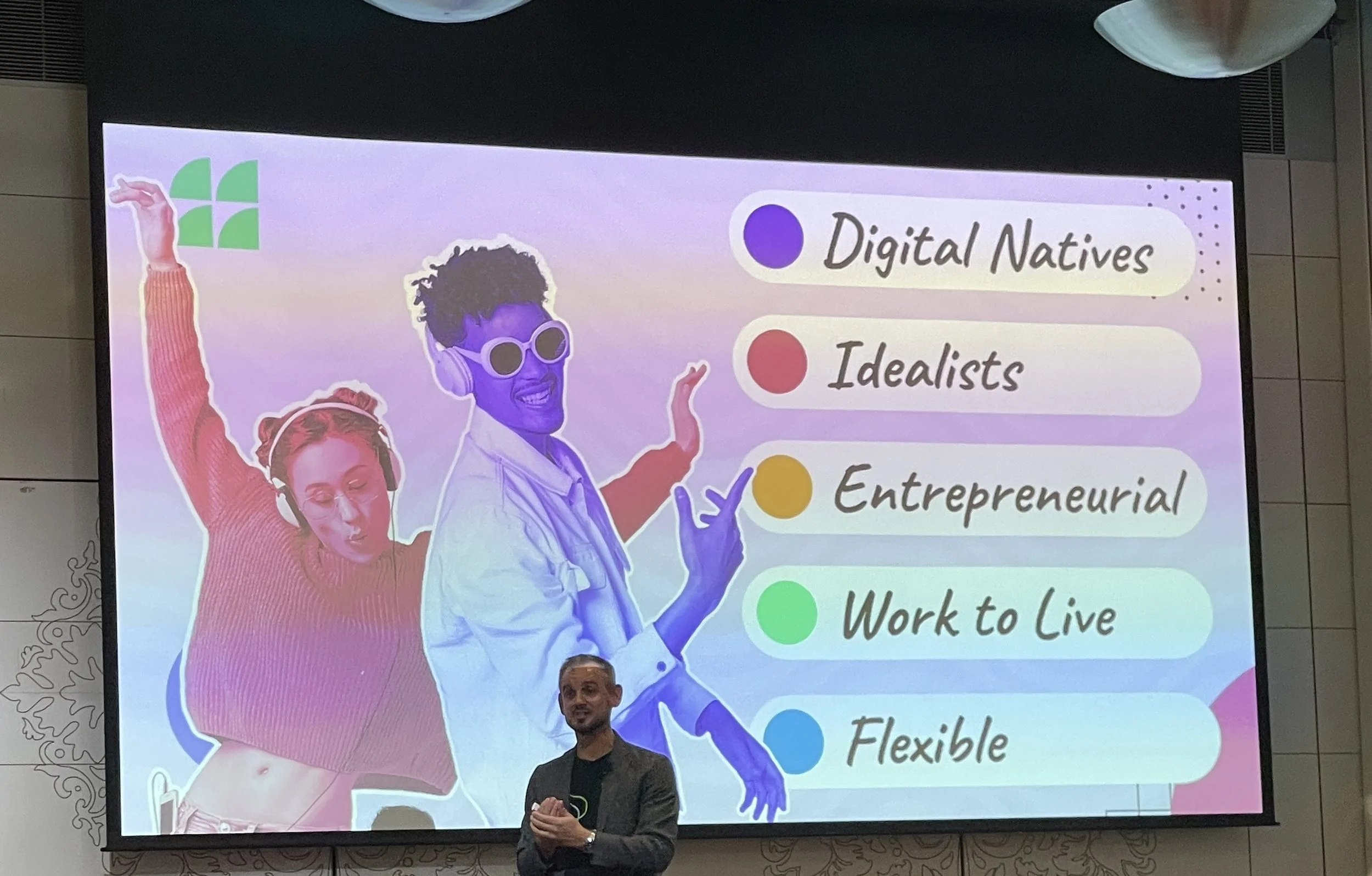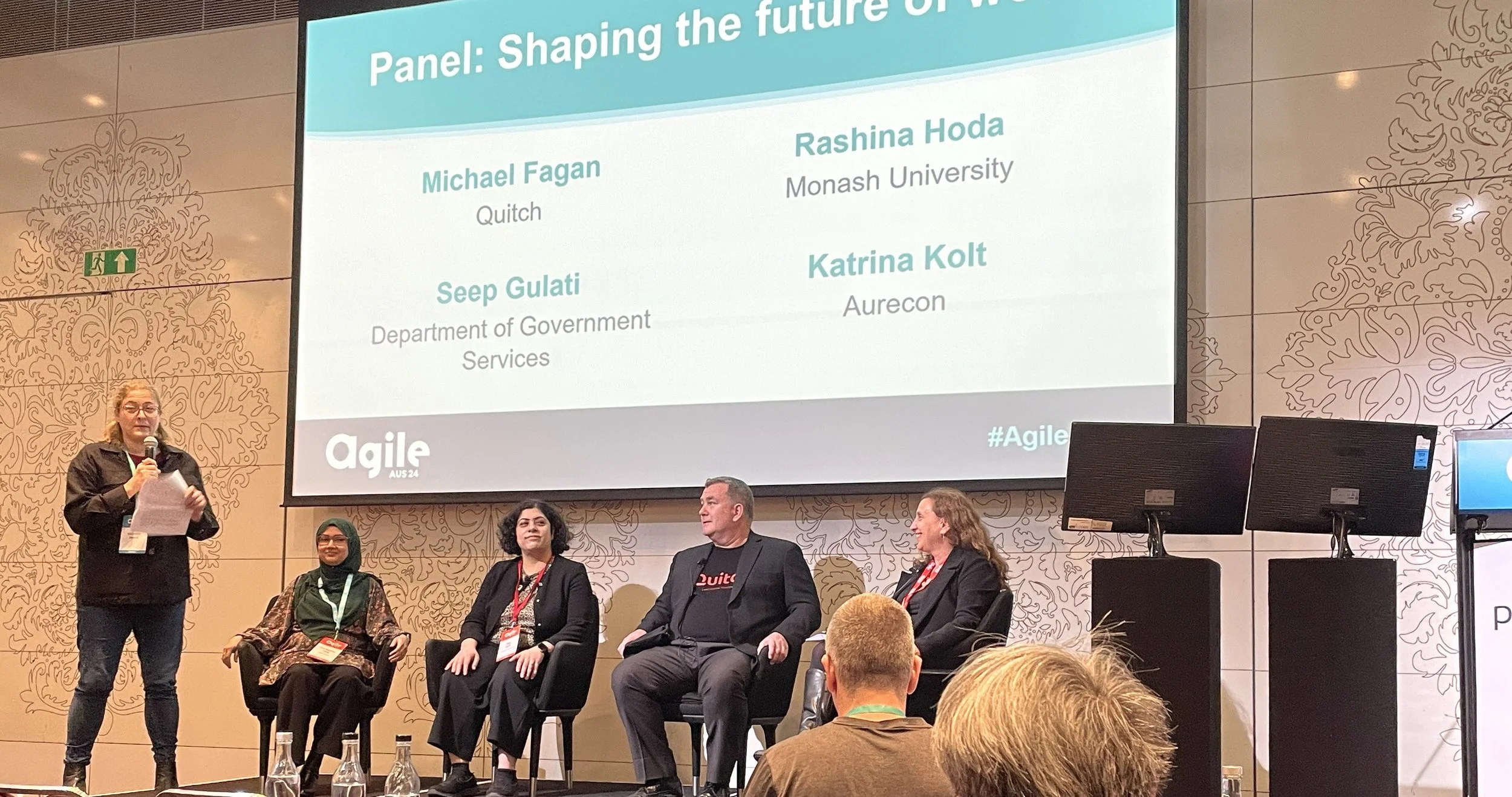Agile Australia 2024 - Day 1
This year, I attended and spoke at Agile Australia 2024 in August. Coming off the back of a big tour of Europe, which included speaking at Agile 2024 in Manchester and running a masterclass workshop with Team Topologies author Matthew Skelton, it was a period of enquiry and curiosity, mixed with the inevitable anxiety that comes with preparing for two major talks.
Returning to Australia was a busy time, catching up on work and our business. Now, in September, I find myself with some space for reflection. Conferences are a huge mind-expander for me. I’m always looking for stories and real-world examples of work—things I can learn from, build on, and try out for myself. I’m also on the lookout for new threads to pull at, asking myself, "What can I learn?" and reflecting on things I may have forgotten—like why agile principles are so effective or practices I may have drifted from, such as engineering practices.
Doing my conference book reports in reverse order, I’ll start with Agile Australia in August. This conference was well-attended—hats off to Rachel and the team at Slatts for this, as it's no easy feat to sell out events these days with so many shifting online. I definitely felt the vibe of previous Agile Australia conferences and had the chance to chat with a fantastic group of people while making new acquaintances along the way.
Day 1
Keynote – A yarn with Eddie
Eddie Betts, AFL Media, ex AFL star player.
Normally, any kind of sporting speaker immediately leaves me cold—an unpopular opinion in a sport-obsessed country, I know. But I’ve finally accepted that it’s okay to admit I’m not interested in sport. If I were, maybe I wouldn’t be so obsessed with the things my community seems to appreciate in me: Agile and Lean ways of working and leading.
Reflecting on Eddie’s theme, I ask myself how can I play a positive part in calling out some shameful realities about racism in our society? First, by acknowledging Eddie’s brilliant performance in launching the conference, and recognising that this wasn’t a talk about sport at all. Eddie shared his personal story of growing up as an Indigenous football player in Australia. His talk was filled with heart, humour, and warmth, but also a shocking moment that highlighted the extent of racism in our society. It was a wake-up call for all of us to do better. Eddie left the audience challenged, inspired, and united—an epic start to what became an excellent day of talks.
Keynote – “The Future Doesn't Exist": Why unlearning ‘the future' helps us to see the present in new ways!
I reserve a little scepticism for anyone who calls themselves a "futurist," but Reanna quickly captured my attention—and my admiration—as she shared thought-provoking insights on practising a futuristic perspective on the world. It was intensely engaging and surprisingly heartening. I recommend following Reanna’s work, as she was entertaining, generous in how she connected us to her ideas, and left me with something practical: “How we think about the future shapes how we act in the present.” We can take small, intentional steps towards the future we want to be in. Her message left me feeling both positive and empowered. And, as a sidebar, anyone who creates visually stimulating, cohesive, and attractive slides that enhance the speaker's message deserves bonus points. It was a pleasure for the audience to absorb.
Empowerment = gold at the end of the rainbow
Chris Howard
ABC
Anyone who uses the word "empowerment" in their title automatically gets my attention. Having published Empowered Agile Transformation last year, I’m predisposed to admire people who resonate with that word. And then there’s Chris’s employer, the ABC—an organisation I’ve been a lifetime fan of, so this was a must-see for me.
Chris’s talk not only looked fantastic (did I spot a professional design eye on those slides?), but he also delivered a confident and informative presentation on his secrets for creating products customers love through great product teams. Some of the insights that resonated with me: aligning team structure to domain, which Chris listed as something that "worked." Thumbs up from me—this is a success factor I’ve observed in team formation. On the "didn’t work" side: leadership not taking accountability for setting direction, and the reminder that "Empowering teams requires leaders to let go." I hear you, Chris. Same.
Agility and the art of wargame design
Benjamin Chee
Westpac
We were lucky to have Ben, a real-life game designer, share his journey in creating tabletop wargames. I find it fascinating to see agility transposed from traditional software development into the realm of—well, realms! Fast feedback loops, experimentation, and emergent design, all so familiar in software development, but applied to physical products. Building physical products is different, right? So, does the need for agility come first, and then Agile techniques are applied? Or do creators naturally possess an agile mindset that helps shape their discipline? Fascinating questions! I’ve been fortunate to continue the conversation with Ben after the talk.
From fear to outcomes: coaching leaders for agility
Roman Lobus
Singapore Airlines
My notes from Roman’s talk are filled with quotes, as this is a topic that particularly interests me. Roman focused on leadership as a barrier to implementing agility. Sign me up! At this point in my career, most of my work involves interacting with senior leaders, so I was ready to take notes.
Roman shared a story about coaching two senior leaders who needed to work together to support an adoption. Some gems from Roman: "How can I shift from an order-taker to an influencer?" and "How can I engage leaders in conversations that lead to meaningful behaviour change?" He advised us that we are "upgrading operating systems to expand the capacity to operate in complexity"—a great metaphor for consulting and coaching in ways of working. He also introduced a concept I liked: "contracting," and that you can "always re-contract," meaning you can redefine and make explicit the work you’re doing to shift from an order-taker to an agent of awareness and change.
Leadership: It's all on you, but it's not about you
Chris Chan
Bupa
Chris’s talks are always a highlight, so this one was firmly on my agenda. He shared 10 stories of 10 leaders, with identities changed to protect the innocent. Chris introduced the Leadership Circle assessment tool, which I noticed was mentioned in at least three different talks at Agile Australia this year. I first came across this model at REA Group in 2016, so it seems to be enjoying a kind of omnipresence now.
I’m open-minded about such tools, though I’m more in favour of what they’re trying to achieve—which was exactly Chris’s point: creating moments of awareness in leaders. He described it as “a transformational can opener,” which I found fitting.
At this point, I was on the edge of my seat, as my own talk on Day 2 touched on this very topic. Perhaps we’re all converging on what it will take to inspire leaders to embrace transformational change?
One quote I captured that seemed prescient: “The organisation cannot perform at a higher level of performance than its collective consciousness.” As always, Chris delivered thought-provoking and intelligent insights.
Changing governance to drive better outcomes, faster
Catherine Drury &
Simone Taylor
Roche
I must admit, I was surprised to find myself attending a talk with “governance” in the title, but I ended up being glad I was there. What Catherine and Simone shared as senior managers was truly one of the good news stories of agility.
We often forget how hard it is to shift the mindset of teams like finance and compliance. Sometimes, we ignore them and focus on helping the sexier digital, product, and tech teams. But I was genuinely inspired by Roche’s story.
From a slow, top-down planning process that was centrally controlled, the company decided to transform by having leaders and finance go first. They removed their entire global finance process, completely rethinking planning and governance. Compliance was no longer tacked on at the end but involved from the start to help achieve the best outcomes. “Compliance is everyone’s responsibility; it’s not just a function of [insert boring framework name].” They also reduced hundreds of 30-page Standard Operating Procedures to far fewer, more digestible 2-3 page documents. They even implemented Bjarte Borgnes’ Beyond Budgeting, although acknowledging that sometimes the pendulum swings too far and needs to be nudged back to balance.
While their slides weren’t the most dazzling at the conference, the outcomes they achieved were impressive: 190 days of planning time saved, and a patient program that went from 9 to 3 months. An inspiring success story.
How not to make a group decision
Charlotte McKinnon
REA Group
Charlotte, a Delivery Lead from REA Group whom I know as a fantastically talented leader in their Fin Services team, also has a knack for storytelling. She demonstrated this through a humorous tale of a failed group holiday decision that took 56 days—a perfect segue into discussing better ways to bring people along in the decision-making process.
Her straightforward tips and approach resonated with the packed crowd. It was also great to see REA Group on stage as one of Australia’s most mature agile software delivery environments, contributing to their success as a digital business leader.
Unlocking Gen Z+ potential: future-proofing your workforce
This was a marvellously entertaining and insightful talk by Luke. I’ll admit, I attended partly to gain insights into the Gen Z workforce, but also to understand my own children—since I have three in this generation.
Here are some Gen Z facts I learned: Did you know that Gen Z is already 27 years old? They’ve overtaken Boomers in terms of workforce percentage, and by 2025 they’ll make up a quarter of the workforce. On average, Gen Z changes jobs every two years, so there’s a massive upside to increasing their engagement.
Luke shared more insights: Gen Z wants to continuously develop their skills and experiences. They need to “understand the purpose”—they want to know the “why” and want to see that you’re genuinely living up to it. They also value transparency, growth, and being genuinely appreciated. This was an engaging and vibrant talk, complete with well-designed slides, and provided just the right energy boost at this point in the day.
Panel: Shaping the future of work
Michael Fagan
Quitch
Seep Gulati
Department of Government Services
Rashina Hoda
Monash University
Katrina Kolt
Aurecon
To round out the day, I joined a panel session where a diverse group of voices discussed shaping the future of work.
It was great to hear from all the contributors, though I wished there had been more time—there was so much more to explore! Some insights I found quote-worthy:
How will AI impact the future of work? “It’s already impacting us. Students are scared about whether they will be relevant.”
“Work is changing faster than the things changing around us. The skills we have today can’t match the jobs of tomorrow.”
What are forward-thinking organisations doing about the future of work?
They’re educating people and investing in education—Michael offered this as a piece of cautionary advice.
They’re experimenting; forward-thinking organisations adopt an experimental approach.
They’re developing ethical AI principles because they know it will have an impact.
They’re taking mental health seriously in the workplace, as this is already a real issue for workers today, and it will only continue to be a concern for the future.
That concludes the book report of Day 1 of Agile Australia!






